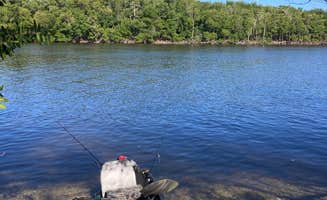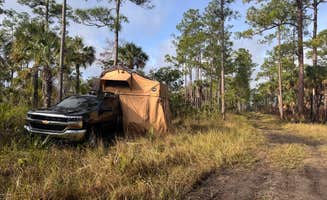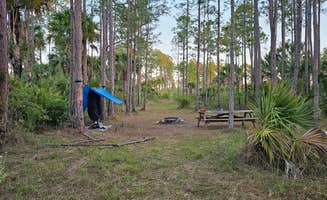Dispersed camping near Goodland, Florida requires advanced preparation due to its remote wetland location. Sites around this Gulf Coast area sit within environmentally sensitive ecosystems characterized by mangrove forests, sawgrass marshes, and cypress strands. During winter months (November-April), conditions remain relatively dry with temperatures averaging 65-80°F, creating optimal camping weather with fewer insects.
What to do
Paddle exploration: Access Backcountry Crooked Creek Chickee by boat only, where fishing opportunities abound. "Fishing is epic, even from the chickee. Stay quiet and look under the platform, tarpon, snook and drum were always around," notes camper Paul W.
Wildlife observation: The area surrounding rustic camping near Goodland, Florida hosts diverse native species. Bird watching opportunities peak during winter migration seasons when wading birds concentrate in remaining water sources. Multiple primitive campsites serve as excellent observation points.
Hiking: The Florida National Scenic Trail passes through several camping areas, connecting primitive sites. Ivy Primitive Camp sits directly on the trail and serves as a convenient overnight stop for through-hikers traversing the preserve's varied terrain.
What campers like
Solitude: The remote nature of primitive camping near Goodland provides true disconnection. At Panther Camp, campers appreciate the isolation: "Great spot to disconnect. Primitive. Free," writes J R., highlighting the simple, undeveloped appeal.
Cost effectiveness: Dispersed sites throughout Big Cypress National Preserve offer no-cost overnight options. While permits are required, most are free and easily obtained through preserve websites or visitor centers.
Natural setting: Nobles Primitive Camp delivers an authentic Florida wilderness experience. Trevor G. describes it as "Great remote drive out to the primitive site 'old Florida' the paved road turns to dirt/gravel. One way in one way out. It is located next to marsh land."
What you should know
Water management: No potable water exists at any primitive sites. Campers must pack in all necessary drinking water. Surface water requires extensive filtration and treatment, with additional concerns about wildlife contamination.
Access challenges: Roads to primitive sites may flood seasonally. Carpenter Primitive Camp requires hiking access year-round, while others may transition between drive-in and hike-in depending on precipitation levels and seasonal water tables.
Environmental regulations: Regulations vary between the Everglades National Park and Big Cypress National Preserve. Fire restrictions, food storage requirements, and waste disposal rules differ between jurisdictions and must be confirmed before arrival.
Tips for camping with families
Distance planning: When camping with children at primitive sites, carefully assess hiking distances. Panther Camp sits approximately 5 miles from trailheads, potentially challenging for younger hikers carrying gear.
Communication options: Despite remote locations, cell coverage exists at some sites. J R. notes about Panther Camp: "Strong cell signal due to cell towers at the rest stop." This provides emergency communication capabilities but varies by carrier and specific location.
Activity timing: Plan outdoor activities during mid-day hours at Ivy Primitive Camp and other rustic sites, when insects are least active. Morning and evening hours typically bring increased mosquito and no-see-um activity, especially during warmer months.
Tips from RVers
Site limitations: Traditional RV camping is not supported at any primitive sites near Goodland. Vehicle access, where permitted, typically accommodates only high-clearance vehicles or standard passenger cars during dry conditions.
Alternative arrangements: For RV travelers exploring this region, established campgrounds in nearby Collier-Seminole State Park provide full hookups while allowing day trips to primitive areas.
Supply planning: No facilities exist for water refills, waste disposal, or other RV services at primitive sites. The nearest supply points are in Everglades City or Marco Island, requiring complete self-sufficiency for any backcountry explorations.




